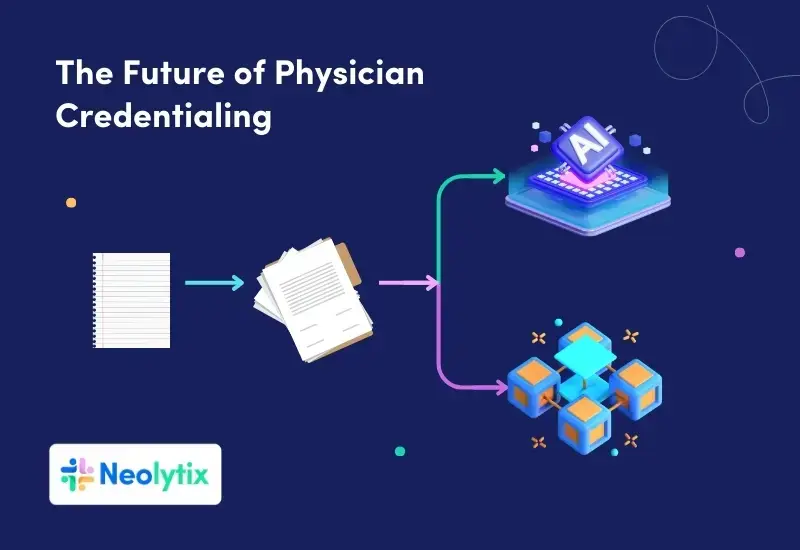Physician credentialing, a critical backbone of healthcare integrity, stands at a pivotal juncture shaped by unprecedented technological evolution. This essential process, historically trapped in manual verifications and extensive paperwork, is undergoing a transformative shift.
The advent of digital solutions, fueled by artificial intelligence and blockchain, promises to redefine the traditional paradigms of verifying healthcare professionals’ qualifications.
As these innovations promise to greatly improve the efficiency, security, and reliability of the future of physician credentialing processes, healthcare organizations stand ready to explore a new era where ensuring the quality of patient care is more streamlined and assured than ever before.
The Current State of Physician Credentialing
The physician credentialing process has always been a bit slow and full of paperwork. Many healthcare organizations are still stuck with traditional methods, leading to credentialing challenges for physicians, such as long wait times and frustrating inefficiencies. These issues don’t just delay doctors from getting to work, they can also affect patient care.
In a time where speed and accuracy matter, healthcare needs a more modern approach to credentialing.
Understanding the Shift in Credentialing
Physician credentialing, fundamentally, is the verification of a healthcare professional’s qualifications, including their educational background, training, experience, and licensure. It’s a critical safeguard in the healthcare system, ensuring that only qualified individuals provide care.
As we’ve mentioned, the introduction of digital credentialing, supported by artificial intelligence (AI), is transforming this traditional process. Digital credentials offer a secure, instant way to verify qualifications, while blockchain provides an immutable record, enhancing trust and transparency. AI and machine learning are automating and accelerating the verification process, marking a significant shift from the labor-intensive methods of the past.

The Evolution and Timing of Credentialing Changes
The journey of credentialing from a predominantly manual and paper-based process to a digital and automated one reflects broader technological advancements and societal shifts toward efficiency and security. This evolution has been gradual but is gaining momentum with the proliferation of digital tools and platforms.
Current trends suggest a future where credentialing is not only instantaneous but also more secure and less prone to human error, driven by ongoing technological innovations and the increasing demand for more agile and responsive healthcare systems.
Stakeholders in Healthcare Credentialing
At the heart of the credentialing ecosystem are multiple stakeholders – healthcare organizations, physicians seeking credentials, patients relying on qualified care, and the credentialing bodies overseeing the process.
Each plays a pivotal role, but the emergence of technology providers and management service organizations like Neolytix introduces a new dynamic. By leveraging cutting-edge technologies and process optimization, these entities are streamlining credentialing, reducing turnaround times, and minimizing administrative burdens, thereby enhancing the overall efficiency of healthcare services.
Credentialing Across Boundaries
The rise of telemedicine and remote healthcare services, accelerated by global health challenges, has brought new dimensions to credentialing. Healthcare professionals are now providing care across state lines and even internationally, requiring a reevaluation of traditional credentialing systems.
Interoperable credentialing systems, capable of accommodating healthcare professionals regardless of their geographical location, are becoming essential. This shift towards a more unified and flexible approach ensures that patients everywhere have access to qualified healthcare providers, marking a significant step forward in global health connectivity.
The Importance of Change
Navigating the Maze of Credentialing Systems
Healthcare organizations today grapple with a labyrinth of credentialing systems, each with its own set of protocols, leading to inefficiencies and data silos. This fragmentation hampers the seamless exchange of vital credentialing information, leading to delays in the onboarding of healthcare professionals and potential gaps in patient care.
The absence of data interoperability further compounds these challenges, making it difficult to maintain a consistent and reliable verification process across different platforms and systems.
Enhancing Care through Technological Adoption
The adoption of new credentialing technologies is not just a matter of administrative convenience but a critical step towards improving patient care.
By integrating advanced technologies like AI and blockchain, healthcare organizations can ensure the credentials of their professionals are verified accurately and swiftly, thereby enhancing the safety and reliability of patient care.
Additionally, these technologies offer robust data security measures, protecting sensitive credentialing information against breaches and unauthorized access, and boosting operational efficiency by automating time-consuming verification tasks.

Technological Advances: The Backbone of Modern Credentialing
AI and machine learning algorithms automate the verification process, parsing through vast datasets to verify credentials accurately and efficiently, thus minimizing human error and streamlining the entire process.
The Power of Continuous Monitoring
In the ever-evolving healthcare landscape, the need for continuous monitoring of credentials cannot be overstated. Real-time updates ensure that any changes in a healthcare professional’s status, such as new qualifications or potential issues, are immediately reflected, maintaining the accuracy and integrity of credentialing information.
This proactive approach ensures that healthcare organizations always have the most current and comprehensive understanding of their professionals’ credentials.
Emerging Trends in Physician Credentialing
Thankfully, technology is changing the game. With automated credentialing solutions, the process is becoming faster and less prone to human error. Additionally, blockchain in healthcare credentialing is making it easier to securely verify qualifications, reducing the risk of fraud while speeding up approval times. These medical credentialing trends are transforming the way healthcare organizations operate, bringing much-needed improvements.
Digital Credentialing Platforms
Today’s digital credentialing platforms for physicians offer a centralized way to manage credentials, cutting down on paperwork and manual verification. Many organizations have already experienced the benefits, with digital credentialing success stories showing faster onboarding, reduced costs, and fewer errors. It’s clear that switching to digital platforms is the way forward for modern healthcare providers.
The Role of Artificial Intelligence
The rise of AI in physician credentialing is another exciting development. AI can help healthcare organizations sort through credentials quickly, ensuring that everything is accurate and up to date. With AI verification in credentialing, errors are minimized, and the process moves faster than ever before. It’s a win-win for both physicians and healthcare organizations.
Interoperability and Standardization
One of the biggest challenges in credentialing has always been the lack of system-wide communication. The need for interoperability in healthcare credentialing is more important now than ever. When systems can easily exchange information, the entire process becomes smoother. Efforts toward standardization in physician credentialing are helping create a unified approach, making it easier to verify and onboard physicians quickly.
Future Regulatory and Compliance Changes
Looking ahead, the future of credentialing regulations will be shaped by new technologies like AI and blockchain. Healthcare organizations will need to adapt to these changes to stay compliant. Preparing for compliance in future credentialing is crucial as regulations evolve to keep up with these innovations. Staying ahead of the curve will ensure organizations can maintain high standards of care.
The Impact of Telemedicine
With the rise of telemedicine, telemedicine credentialing is becoming a key focus. Doctors are now working across state lines, which means traditional credentialing systems need to catch up. Cross-state credentialing for telemedicine is an emerging challenge, but digital tools are helping make this process easier and more reliable.
The Role of Credentialing Services
As technology changes the landscape, the future of credentialing services lies in adapting to these new trends. Companies offering tech-driven credentialing services are leading the way, using tools like AI and blockchain to streamline the process. By partnering with these services, healthcare organizations can stay efficient and focus on what really matters: providing quality care.
Streamlining the Credentialing Process
Navigating Complex Systems
Strategies for overcoming these challenges include the adoption of integrated platforms that consolidate various credentialing processes into a single, user-friendly interface. By doing so, organizations can eliminate redundancies, reduce errors, and improve overall efficiency.
Smooth Transitions through Training and Adaptation
Ensuring a smooth transition to digital and AI-enhanced credentialing processes is paramount. Healthcare organizations can achieve this through comprehensive training programs that equip staff with the necessary skills to navigate new technologies.
A phased adoption strategy can also help organizations gradually adapt to new systems, minimizing disruptions to existing processes.
Embracing the Future of Credentialing
The future of physician credentialing is characterized by speed, security, and efficiency, driven by technological advancements such as AI and machine learning.
As healthcare organizations look to navigate this new landscape, the need for expert guidance and innovative solutions has never been greater. Neolytix stands ready to lead this transformation, offering cutting-edge credentialing solutions that meet the demands of modern healthcare and pave the way for a more integrated and responsive healthcare system.
By partnering with Neolytix, healthcare organizations can confidently step into the future of credentialing, ensuring they remain at the forefront of quality patient care and operational excellence.
Complete the form and someone from our team will be in touch with you!



